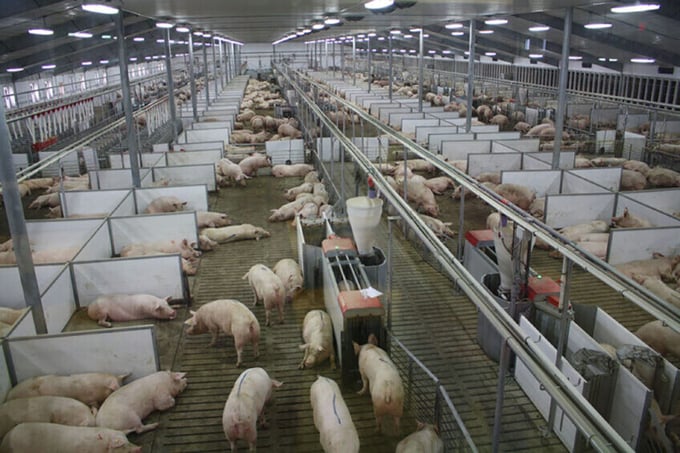May 24, 2025 | 16:24 GMT +7
May 24, 2025 | 16:24 GMT +7
Hotline: 0913.378.918
May 24, 2025 | 16:24 GMT +7
Hotline: 0913.378.918

Group housed sows at a farm in Indiana. Photo: Vincent ter Beek
Proposition 12 is a California state law from 2018, also known as the “farm animal confinement initiative.” It will take effect on January 1, 2024. It requires that pork meat sold within the state of California, the largest US state market for pork, must meet certain sow housing requirements related to freedom of movement and larger floor space per pig.
In addition, in 2016, the state of Massachusetts passed Question 3 (Q3), which is similar to Prop 12. However, it goes further in that it prevents the shipment of non-compliant pork through the state, affecting several state markets.
The Supreme Court upheld Prop 12 in May 2023. Now, to counteract this, 2 Republican senators introduced a piece of legislation called “The Ending Agricultural Trade Suppression Act” (which technically is a bill until approved by Congress, ed.). The act is supported by the National Pork Producers Council (NPPC) and the American Farm Bureau Federation, as well as almost 3 dozen co-sponsors in the US House of Representatives and 13 senators (besides the 2 who introduced it in the US Senate).
However, a letter against the act has been signed by other Republican legislators. They state that the act, “as applied in this circumstance, it is at odds with our foundational Republican principles of states’ rights, national sovereignty and fair competition.”
This group is concerned that the act would provide WH Group, a Chinese company that owns the largest US pork producer Smithfield Foods, “with a mechanism to bypass state-level laws and rapidly acquire even more American land and pork industry assets with no restraints at all.”
There are those, such as Dr Monique Pairis-Garcia (associate professor, veterinarian at North Carolina State University and columnist at Pig Progress), who believe the US industry can manage to find ways to comply with newly-introduced standards. However, others at the World Pork Congress were of the opposite view. Michael Formica, NPPC chief legal strategist, stated that Prop 12 is “catastrophic for farmers in Iowa” and “also for consumers in California” due to increased pork prices in that state.
Dr Steve Meyer, an agricultural economist at Kerns and Associates, explained further that because non-compliant pork will no longer be able to be sold in California next year, it will be introduced into other US states, leading to an oversupply outside California. He noted that “the price of pork will have to drop 10-15% cutoff value per hundredweight, and prices are already low.”
However, about 2 years ago, 2 of the largest US pork companies, Tyson Foods and Hormel have already agreed to comply with Prop 12. Canadian pork is also sold in the US, and major Canadian integrated pork producer Maple Leaf Foods has already transitioned to open housing for gestating sows. Quebec-based duBreton produces a line of ‘humane-certified’ pork that complies with Prop 12. In addition, several farm equipment companies are producing Prop-12 compliant housing options.
(PP)

(VAN) Alt Carbon has raised $12 million in a seed round as it plans to scale its carbon dioxide removal work in the South Asian nation.

(VAN) Attempts to bring down the price of the Japanese staple have had little effect amid a cost-of-living crisis.

(VAN) Fourth most important food crop in peril as Latin America and Caribbean suffer from slow-onset climate disaster.

(VAN) Shifting market dynamics and the noise around new legislation has propelled Trouw Nutrition’s research around early life nutrition in poultry. Today, it continues to be a key area of research.

(VAN) India is concerned about its food security and the livelihoods of its farmers if more US food imports are allowed.

(VAN) FAO's Director-General emphasises the need to work together to transform agrifood systems.

(VAN) Europe is facing its worst outbreak of foot-and-mouth since the start of the century.